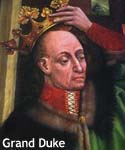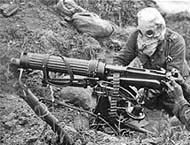Between the 6th and 8th centuries pagan Slavic peoples migrated throughout Eastern Europe, with some settling in present-day Belarus, Russia and Ukraine.
A few centuries later, Polotsk (or northern Belarus) emerged as the dominant center of power on Belarusian territory, with a lesser role played by the southern reaches of the territory.
 In 1385, in an important move for Belarus, its neighbor Lithuania's Grand Duke accepted Poland's offer to become its king. He consequently converted Lithuania to Christianity and established a personal union between the two lands.
In 1385, in an important move for Belarus, its neighbor Lithuania's Grand Duke accepted Poland's offer to become its king. He consequently converted Lithuania to Christianity and established a personal union between the two lands. In 1569, the Polish–Lithuanian Commonwealth was created making it an influential player in European politics and the largest multinational state in Europe. While Ukraine and Poland became subject to the Polish Crown, the present-day Belarus territory was still regarded as part of Lithuania.
As the Commonwealth continued to prosper, so did Belarus, but that economic growth came to an end in mid-17th century when a series of debilitating wars against Sweden, Russia, and others devastated the territory.
By the end of the century most of the Polish-Lithuanian Commonwealth was in ruins. It is estimated that the Commonwealth lost a third of its population, with some regions of Belarus losing as much as 50%.
Now weak, and mostly unable to defend itself, the Commonwealth was vulnerable and additional wars in the area (Great Northern War) and the (War of Polish succession) further devastated the peasant population of Belarus.
By the end of the 18th century, Poland, Lithuania's partner in the Commonwealth was partitioned by its bordering neighbors, and Belarus, partially occupied by Russia at the time, would be completely occupied by the early 19th century.
While under Russian control, Jews in the Russian Empire were now all required to settle in Belarus in a region called the "Pale of Settlement" where life was hard and poverty-stricken.
 Then came World War I, a major war centered in Europe that began in the summer of 1914 and lasted until November 1918. As it raged across Europe, Belarus came under German control, which continued throughout the entire conflict.
Then came World War I, a major war centered in Europe that began in the summer of 1914 and lasted until November 1918. As it raged across Europe, Belarus came under German control, which continued throughout the entire conflict. In 1917, during the war, the Bolsheviks overthrew the Russian Provisional Government during the Russian Revolution and Russia withdrew from the war.
By war's end, millions were dead and some large European powers (including Germany and Russia) lost vast tracts of land, and were militarily and politically defeated by the allies.
The remaining German forces finally withdrew from Belarus, and on January 2, 1919, the Soviet Socialist Republic of Byelorussia was declared. Regardless, Poland and Russia were now preparing to reclaim (once again) what they saw as their territory, and they soon did.
When the Red Army entered Minsk on January 5, 1919, the local government went into exile, and by 1921, the Belarusian territories were divided between Poland and Soviet Russia.The Polish part of Belarus (in the west) was subject to the imposition of elements of Polish culture, while Soviet Belarus (in the east) became one of the original republics which formed the Union of Soviet Socialist Republics, or USSR.
 On September 17, 1939, the Soviet Union invaded Poland, and consequently seized western Belarus. Some twenty months later, Germanyinvaded the Soviet Union (including Belarus) on June 22, 1941.
On September 17, 1939, the Soviet Union invaded Poland, and consequently seized western Belarus. Some twenty months later, Germanyinvaded the Soviet Union (including Belarus) on June 22, 1941. Belarus suffered greatly during the subsequent fighting and German occupation, and by the end of August, 1941, the present-day Belarus territory was totally occupied by the German army.
During World War II, Jews and others died in regional concentration camps; the third-largest Nazi concentration camp was set up at Maly Trostenets (near Minsk) where over 200,000 people were executed.
In 1944, because of the efforts of the Americans, British and other allied forces, it became clear that Nazi Germany would not win their war in Europe, or for that matter inRussia, and in the end it was soundly defeated.
That fact meant little to Belarus, as it had lost 25% of its pre-war population, over 9,000 villages were destroyed and the towns of Minsk and Vitsebsk were in ruins.
As the German forces were in retreat across Europe, the Red Army drove the remaining Germans out of Belarus, and the long rebuilding and recovery process began
The Soviet Union, in an effort to help spark the Belarus economy, established new industries and it wasn't long before Belarus became a serious center of manufacturing; new jobs were the result and some levels of prosperity returned.
And then on April 26, 1986, an explosion and fire at the Chernobyl Nuclear Power Plant in the Ukraine released large quantities of radioactive contamination into the atmosphere, which spread over much of western Russia and Europe.
Nearly 60% of the radioactive fallout landed in Belarus. Large areas were contaminated, forcing the evacuation and resettlement of 200,000 people.
To contain the contamination and to avert a greater catastrophe, the Soviets spent a billion rubles which all but crippled its economy. Regardless, some contamination effects still linger and Belarus struggles with environmental conditions in the southeast, and the overall health of its people.
 In the very late 1980's, Soviet President Gorbachev introduced policies in Russia to help reduce the corruption at the top of the Communist Party. That move called 'Glasnost' sparked a passionate desire for freedom across The Soviet Union, and in the end freedom from Communism caused the total collapse of the country in 1991.
In the very late 1980's, Soviet President Gorbachev introduced policies in Russia to help reduce the corruption at the top of the Communist Party. That move called 'Glasnost' sparked a passionate desire for freedom across The Soviet Union, and in the end freedom from Communism caused the total collapse of the country in 1991. With that Russian breakdown in progress, the doors of individual freedoms opened and on August 25, 1991, Belarus issued a declaration of independence, and in 1994 elected Alexander Lukashenko as its first president.
Since then, Lukashenko has tightened his grip on authoritarian power, and although his methods are consider harsh by some in the west, the economy remains stable, people are some what prosperous, and that was certainly not the case during the Soviet era.
Belarus has retained closer political and economic ties to Russia than any of the other former Soviet republics. In fact, Belarus and Russia signed a treaty in 1999 that envisions greater economic and political and integration.
As for tourism, our staff has been to the capital city of Minsk, and it has an excellent mass-transit system (spotless subway), wide prospects (streets), and plenty of gregarious people to make any visitor feel welcome.
No comments:
Post a Comment